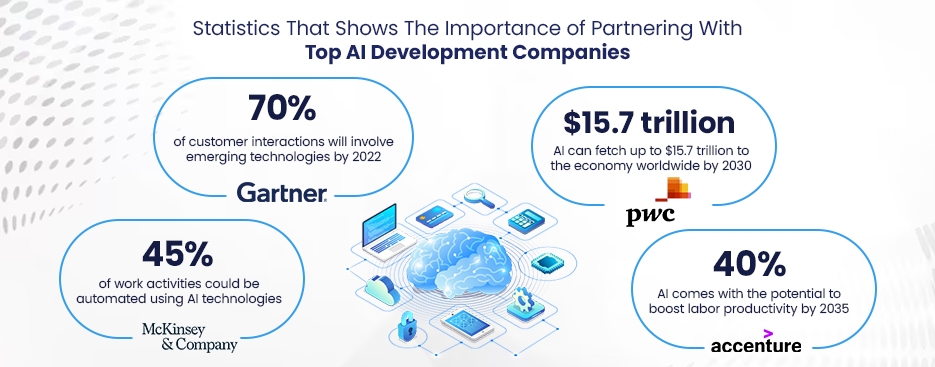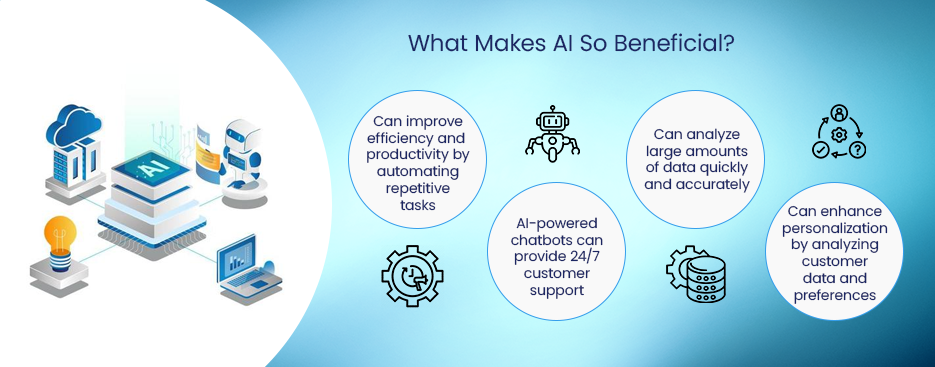Table of Contents
AI is today disrupting how business works and solves complex issues. The increase in AI has caused a lot of organizations to be at the forefront by delivering advanced tools and products. However, what are the right moves to take in order to benefit most from the top Artificial intelligence companies?
Modern society is reliant on technology whereby artificial intelligence is now part of different fields. This includes health care, finance etc.
Working with suitable AI companies can only help you reap maximum returns. All this from your investment in artificial intelligence services for business growth. These businesses own the competency, assets, and knowledge to design custom made AI solutions. All this in response to your own requirements and obstacles. Utilizing them allows you open up new avenues of business, streamline operations, and give you an edge in any industry. This article looks into various ways in which you can use the top Artificial Intelligence companies. Let’s begin now so that your business is highly impacted.
Importance of partnering with top Artificial Intelligence companies for maximum impact

First: The rise of the specialist
As businesses progress along their AI journey, it’s likely that they’ll face new and unforeseen issues that span strategies, culture or ethics. The only thing that is certain is that 34 percent of UK executives along with 20% of workers are aware how to assess the business advantages of their company’s AI investments. This is evident when you consider that AI isn’t just one technology, but rather a mix of a variety of technologies, from machine learning to analytics and the usage of all of them is increasing.
Artificial intelligence development services are being utilized by organizations of all sectors today. This is why we’re seeing more specialists working together to offer better, more customized solutions that combine different techniques, including AI chatbots, machine learning, and analytics.
In the AI technology age, all businesses are software company, which is why it’s wonderful to see the ecosystem of partners changing in this manner to accommodate the ever-changing needs of customers. At Microsoft we are able to help customers, as well as partners, identify the best experts to collaborate with across our ecosystem as well as the full variety of possible AI outputs from projects.
Second: Handling scale and complexity
Artificial Intelligence solution companies are those that incorporate AI into a majority of activities they perform, while organizations that are in the process of experimenting use AI in specific tasks or areas of operation.
According to a study by McKinsey, AI could potentially automate around 45% of work activities, saving businesses time and resources. That means that implementing AI in a larger scale is an evolution process that requires companies to change and change
The study also provides compelling evidence of the connection between an organization’s use of AI in a large size and its ability to compete in the future both in terms of the performance of its business and in terms of cultural change. We’ve witnessed this in our own experience when the conversations that with our partners have grown. For instance, the interfaces landscape where our partners have built an impressive collection of capabilities. These interfaces, commonly known as chatbots, have grown up and down and now have opened the way to intelligent search for a variety of customers as a tool that can be used extensively within the business for staff and also for customers.
This is an excellent illustration of customers being aware that they have to take action however they don’t know what to do. This is where our ecosystem of partners is extremely beneficial in helping them embark on the right path and assisting in its digital journey. According to a study by Accenture, AI has the potential to increase labor productivity by up to 40% by 2035, leading to substantial cost savings for businesses.
Thirdly: Optimizing beyond performance
According to a survey by Gartner, by 2022, 70% of customer interactions will involve emerging technologies such as machine learning applications, chatbots, and mobile messaging. One of the most important fundamentals to scaling AI is to make the technology available to all. This requires establishing a clear set of development standards and operating rules to ensure that the technology is used responsibly and in a manner which actively encourages diversity and inclusivity.
In the present we are not only experiencing a rise in specialization of members of the ecosystem and we’re also witnessing significant value from AI development company. The experience of partners means they can embark along with clients. They can share their own examples of their successes and lessons as well as help the market to develop.
Research and Identify the Top Artificial Intelligence companies in the Industry
The first step in leveraging top Artificial Intelligence companies in USA is to conduct thorough research and identify the leading players in the industry. Each AI firm is unique in its approach or method of addressing the needs of customers. The implications of these variations are usually difficult to determine initially, but can have an enormous impact on the final ROI and the chances of success of the entire endeavor.
Some challenges
Let’s begin with the most difficult challenges that are faced by successful AI-applications as well as the user .
- AI solutions can only be as efficient if they are able to improve the high-quality of questions they are asked. Customers often recognize that AI solution providers can play an essential function in the optimization of a particular process, but the exact question isn’t yet clear.
- Making the appropriate culture of innovation in the organization can be a gradual procedure. AI does not only have an impact on the IT-related services within an organisation, but also the way that other services operate. Understanding the different stakeholder groups and a well-crafted communication strategy are vital to this.
- The fact that the quality of data is a key element to the technical success in the AI project is an overstatement. Like “data cannot be flawless” it is common knowledge. At the start of every project, any issues related to data, inconsistency or lack of accuracy must be addressed. Then, the effect of any issues during the progress of the project should be evaluated in conjunction with the partner AI company.
The observant reader has seen that the challenges mentioned above are a common theme in nearly all IT project. As per top AI companies in USA, they are mostly based on good analysis and communication. We will explain below the way in which choosing an AI company, as well as their approach to it is a factor in the quality of their responses to such issues.
A Waterfall or an Iterative Process?
The strategy of most artificial intelligence service providers can be viewed as iterative or a Waterfall or an Iterative Method. We will explain in detail what it is, and then outline how it affects the success in any AI application.
Waterfall model
Expectations or requirements could be modified over the course of the project because of new knowledge. According to the definition, these changes are not able to be accommodated during the pre-implementation review. This can mean that the programming process doesn’t solve the actual situation, but instead creates an imaginary emergency remains within the document of analysis.
Examples of this in AI applications include:
- Additional data sources must be added to the database,
- The accuracy that is based on the first implementation isn’t enough and a different AI algorithm must be employed,
- The AI model must control other software or produce new data,
- the interface to integrate to external system changes,
- The drift reduces the accuracy of the model and the data transformations that were originally used as well as algorithm selections and hyprtuning is not sufficient anymore.
The second issue stems directly from the first and is about the impact on the ROI or the budget. If the decision is made to keep the initial analysis and method the added value as well as the ROI would be unsure. What does it mean to the project if it does not reflect reality or where the support of the stakeholders is lacking? Another alternative is to restart the project using a fresh analysis. This, of course, can reduce the budget for the project, and more if additional modifications are required during the second phase.
According to several expert respondents, the best way to deal with the risks is an agile approach which begins with the idea that the requirements can’t be determined beforehand and should be developed through an iterative procedure in which development and analysis are alternating or occur in parallel. Scrum, Extreme Programming, and pair programming are only some of the terms that fall under the umbrella of this.
Since realism is a key element by this Agile method it does not pose a concern by itself. It is almost a necessity to decide the requirements to be created over various sprints (time blocks during which programming occurs). Unfortunately, this method can be risky.
Sometimes changes in requirements, or not achieving them correctly leads in delays or budget cuts as a result of a longer development.
Most AI companies focus on a project-based approach to implementation and utilize any of the methods mentioned above. When selecting an AI firm, it is important to inquire which of these two methods is used in the development.
We have compiled a list of top Artificial Intelligence companies that excel in different areas:
- OpenAI: OpenAI is known for carrying out innovative research into artificial intelligence. It has a portfolio of AI tools such as language models, robotics, and reinforcement learning.
- IBM Watson: IBM Watson is among the first companies in AI technology development. It offers products and services in NLP, ML, and CV. They specialize in industry-specific applications.
- Google Cloud AI: Google has an extensive line of AI tools that include cloud AI platforms, machine learning APIs, and data analytical operations as well.
- Microsoft Azure AI: A host of AI solutions for use on the Microsoft Azure platform is available such as cognitive services, machine learning, and building chatbots. They are always on to interoperability with MS techs.
- NVIDIA: NVIDIA manufactures AI hardware and software solutions such as deep learning-based GPUs and artificial intelligence research. Their expertise in AI Infrastructure is quite amazing.
- Salesforce Einstein: The other is Salesforce Einstein, which is an AI platform offering intelligent insights. They also provide suggestions on product issues in the domains of sales marketing as well as customer care. Therefore, they concentrate more on providing customized AI solutions for different business requirements.
However, selecting a top artificial intelligence development company cannot be done just by any means! You must conduct thorough checks on expertise, technology used, data protection, communication as well as cost. By reviewing these areas and analyzing the best Artificial Intelligence firms identified above, you could arrive at a sound judgment. It can even assist you in identifying an appropriate artificial intelligence partner for your company.
Also Read: The Best Conversational AI Platforms for 2024
Benefits of Leveraging Top Artificial Intelligence Companies

AI gives businesses a range of options to streamline and enhance processes. One of the major advantages of top Artificial Intelligence companies is the ability in automate repetitive work. This allows employees to concentrate on more productive and strategic tasks. With the help of top Artificial Intelligence companies can boost efficiency, decrease costs, and offer superior quality products and services to their clients.
Improved Operational Efficiency
One of the main advantages that comes with top Artificial Intelligence companies is that it gives the capability to automatize repetitive and time-consuming jobs, freeing precious human resources. With AI companies can simplify their operations by delegating boring or repetitive work to computers. This allows employees to concentrate in more strategic, innovative aspects of their jobs, increasing efficiency and productivity.
Automating tasks like the entry of data, customer support inquiries, and other routine administrative tasks. AI allows organizations to maximize their workforce and distribute resources more efficiently. AI-powered automation makes your work to be more accurate and of superior quality. It helps you avoid mistakes that humans might make when performing the same task over and over time.
Businesses can utilize AI or machine learning solutions to improve their processes. This could help in managing inventory, bringing items to the right place, and organizing the sequence of production. This will not only increase operational efficiency, but it also decrease expenses and improve overall efficiency.
Case Study:
Company X is a major manufacturing company, uses an AI-driven predictive analytics solution to help optimize the manufacturing process. The system utilized past data and current market news to determine the amount of something a company could produce. This way, they can alter their production levels in line with this.
This is how Company X achieved a significant reduction in excess inventory while responding to customer demands more efficiently.
Enhanced Marketing Strategies
AI has revolutionized how companies manage customer engagement and marketing. With the help of AI algorithms, businesses can study customer behavior as well as preferences and demographics to design targeted marketing campaigns. This type of targeted marketing lets companies effectively reach their customers efficiently and improve the rate of conversion.
Chatbots powered by AI and virtual assistants provide customers with quick and easy assistance. This creates more enjoyment for the user. With AI companies can automatize repetitive tasks, thus freeing the time of the marketing team to concentrate on strategic plans.
Case Study:
Company Y, a major company in the industry has implemented an AI-based segmentation system. Through the analysis of customer data, it identified distinct groups of customers that have specific preferences and needs. This allowed Company Y to tailor its marketing communications, which resulted in a better rate of conversion and better customer satisfaction.
Streamlined Customer Engagement
AI chatbots as well as virtual assistants have revolutionized customer service. Businesses can utilize these to offer assistance promptly and offer customers the best experience. Computer programs are becoming more sophisticated. They are now able to comprehend what people are saying and respond to questions throughout the day.
Automating repetitive tasks and addressing simple questions chatbots enable human agents to tackle more complicated customer concerns. Furthermore, AI-powered assistants examine vast amounts of information to provide tailored suggestions as well as anticipate the needs of customers and offer personalized customer service. This type of service does not just improve customer satisfaction but also boosts efficiency and decreases the costs of companies.
Artificial Intelligence-powered virtual assistants as well as chatbots have the ability to converse with multiple individuals at once. This makes it much easier for users to seek assistance quickly, efficiently, and in a personalized method from companies. These intelligent systems can respond to questions from customers, give suggestions for products, and solve problems, thereby saving time and money.
Case Study:
Company Z a top technology firm, has integrated an AI-powered chatbot onto its social media and website platforms. The chatbot answered customer questions and product recommendations and even processed transactions of a basic nature.
This not only enhanced customer satisfaction but also decreased the burden on the support staff which allowed them to concentrate on more difficult tasks.
Advanced-Data Analytics
AI assists businesses in understanding a lot of information quickly and precisely. This allows them to discover things that were hard or impossible to find before. AI systems can recognize patterns or trends and connect them to data. This allows companies to make informed choices based on facts and research.
This not only improves efficiency in operations but also aids in strategic planning and aids in identifying new opportunities in business. The incorporation of AI has brought a revolution in the way data is collected and has enabled companies to tap the power of information to gain a competitive advantage.
AI algorithms can analyze large data sets and spot patterns or trends that humans might overlook. This allows companies to make data-driven decisions that can drive innovation and growth.
Case Study:
The Company A group, which is a major company in the e-commerce industry has implemented an AI-driven analytics platform for analyzing customer feedback information. Utilizing natural sentiment analysis and language processing it was able to pinpoint the most frequent complaints of customers and areas of improvement. In the end, Company A was able to improve its offerings and improve customer satisfaction.
Want to Learn More About AI and Data Analytics
Steps To Effectively Collaborate And Integrate AI Solutions Into Your Business Operations
As per top artificial intelligence developers, AI Implementation is an ongoing process. It’s crucial to adjust and refine the approach you choose to implement under your company’s particular requirements and needs.
Although AI tools offer substantial advantages, they are restricted by their training data. Humans are still responsible for directing creativity and decision-making processes throughout the process of implementation. Here are the steps to implement AI in your company.
-
Set out your goals
Be clear about your company’s goals and the objectives you want to achieve when the implementation of AI. These goals are essential since they give direction to your AI project, allowing you to decide what’s essential to your company and aid you in choosing the appropriate AI to meet your requirements.
Set clear goals helps keep your focus in the course of AI implementation, and also helps others in the organization understand what you’re trying to accomplish. This will also enable you to evaluate the progress and effectiveness during the AI implementation process.
Remember that business goals must be focused, measurable, attainable, and SMART (specific and measurable, achievable and realistic). The goals you set should not simply describe what you’d like to achieve but also provide the expected outcomes and the necessary timeframe. Find out the areas or processes in which AI is likely to be most beneficial. For example, you could think about finance, marketing, and customer service departments.
The next step is to determine the measurable results for your goals. Are you able to determine if AI implementation results in higher efficiency, consistency, efficiency, or an increase in savings in costs? Implementing AI across multiple areas of your business at one go could result in unintended consequences, like a lack of alignment, insufficient infrastructure, or issues with data quality. Make sure that your objectives are achievable and realistic.
-
Evaluate the level of readiness and resources
Examine your company’s readiness for AI implementation. Evaluate your organization’s infrastructure capability. Does your company have enough resources to be able to support the AI tools you plan to develop? Are your services primarily offline or online, and are they compatible with your AI software? To make it easier for AI adoption, you might require some modifications to your system, for example buying new equipment.
Artificial intelligence, which is a complex and challenging area, requires the proper degree of technical proficiency to tackle its problems effectively. Conduct an assessment of your skills to determine whether you have the right personnel in place to handle AI tools.
If your current team members do not have the skills required it is possible to recruit new employees as mastering artificial intelligence requires time. Partnering with experts will help you improve the efficiency of your AI deployment process.
But the process of assessing your readiness doesn’t stop there. You must evaluate your company’s structure and assess whether it can accommodate forthcoming changes. The possibility of resistance from employees should be expected and you should be prepared to address any new issues with successful change management methods.
-
Make sure you and your team are educated
To incorporate AI into your workflow effectively the team and you must be aware of the basics of the technology. Learn online with sources, like Coursera, Udemy, and Udacity. The short AI-related training courses can also provide users with the basics of AI.
While you learn AI basics, make sure to keep up-to-date with the latest developments and trends in AI. You can join online tech groups or join focused groups on software, depending on the AI software you’re employing.
-
Recognize instances of use
Determine specific scenarios where AI can bring tangible advantages. For instance, if you’re a marketer, consider how AI can assist you in driving revenue, improving customer relations, and enhancing campaigns. Other specific to the market AI applications include segmentation of customers and the creation of customized material, sales forecasting, and optimization of social media.
Find areas in which AI can boost effectiveness, decision-making, and the customer’s experience. For example, incorporating automated chatbots and virtual assistants into your workflow could help you give relevant and meaningful feedback in a short time, and shape customer experiences positively. These bots can also relieve employees from repetitive tasks and allow them to concentrate on other important activities.
Other uses of AI include risk assessment and regulatory compliance, automated financial analysis and reporting as well as inventory management, predictive analytics, and numerous other uses. Make sure you prioritize your applications based on their potential impact and viability.
-
Create a strategy for data
When evaluating your readiness for AI, we mentioned that you need to have sufficient information to train machine-learning models to produce the expected outputs. This is where you should dig further into your information to determine the quality. Training AI models with quality data improves the probability of producing accurate outputs.
Create a data strategy that includes data storage, validation, and management. AI projects require a lot of data to train. Inform your customers about the type of information you’re collecting and the purpose behind it to avoid violating their confidence.
Certain companies provide AI instruments that have been mostly pre-trained. Although this lets you get started using the tool faster bespoke AI tools that have been built on the data of your business are able to provide more customized solutions.
-
Pick the appropriate AI technology and tools
Numerous AI tools can be used to enhance your workflow. Examples include tools such as HubSpot, Influencity, ManyChat, and Surfer SEO are designed for teams in marketing. With the many options available on the market, identifying the best AI technology can be overwhelming, unless you have a plan of action.
Begin by researching various AI platforms, tools, and frameworks that are based on the ability to integrate, their accessibility, and scaling. Consider the applications of particular AI tools and assess whether they are compatible with your company’s needs and goals.
Make sure you check that you can verify that the AI software is compatible with the information available within your company. Check if the data is adequate and is in the proper format as the chosen AI tools need.
In addition to attributes, it is important to examine the pricing plans offered by various AI tools and choose only ones that are that are within your budget.
In the end, it is important to evaluate the privacy and security measures of AI tools in depth. Certain AI technology involves the gathering and processing of personal data. Making sure that the tools you use have solid security measures can protect you from potential security breaches and keep faith in clients.
-
Train and develop AI models
You should think about whether you would like to develop an individual AI model or rely on one already available on the market. Similar to the majority of industrial applications, AI tools already on the market offers easy-to-use interfaces upon implementation. However, they could include features you don’t want and might not be able to address your issues as effectively as you’d prefer.
Once you’ve decided on your favorite models, collect and process the relevant data to aid in the training of your model. The data is now in appropriate format eliminating duplicates and outliers. It fills the gaps to ensure greater consistency and quality. Data can develop algorithms and models.
-
Pilot test and evaluation
Don’t put your AI models into production as soon as you can. Instead, conduct a set of tests piloted in a controlled space to test their precision. A3Logics will connect you to skilled professional security experts as well as testers for software to find problems and bugs in the models you have created.
-
Install and integrate
After assessing the models, you’re now ready to incorporate AI solutions. While doing this, you should make sure that your AI system is fully compatible and seamless with other software systems. It is essential to track the efficiency of the AI model and then make adjustments when necessary. There are times when things go wrong in production. Don’t be afraid when they occur. Prepare your team to handle any issues that arise.
-
Improve and optimize
Always monitor and examine constantly the AI system to make sure that it’s functioning effectively. Examine relevant metrics to determine the effectiveness and impact of the AI solution. Use the data of these studies to determine areas to improve and optimize.
Information technology is a fast-evolving field and new AI advancements are happening almost every day. Staying informed will require more than simply reading the latest headlines. You should consider following blogs and subscribing to industry newsletters written by top executives. Establish a rapport with the AI companies you collaborate with. It would help integrate the latest features into your system.
Explore Limitless Possibilities
Partner With The Best artificial intelligence development company
Final Thoughts
Leveraging the expertise of top artificial intelligence solution companies can significantly enhance efficiency. This aspect enhances the performance and competitive nature of most business sectors. To obtain the intended benefits of using AI, businesses need to define their objectives correctly, select the appropriate AI company, practice good collaboration with the chosen partners, prepare and integrate their data, as well as measure and improve on the solution over time.
FAQs:
Why should I use AI for my business purpose?
Automation of routine duties as well as enhanced decision-making process are some gains that AI can derive for your firm. Improves customer experience, streamlines operations, and fosters innovation.
What way the use of AI could serve different industries?
AI solutions are of great help in health care, financial services, retail, production, logistics, communication with customers, marketing, etc.
Which is the best AI company to select for my business?
Select competent and top artificial intelligence companies with a background in your field. The company, A3Logics provides various AI solutions, is reliable, and works for you under your organization’s goals.
In what period will we see this solution implemented using AI?
The duration of introducing such a solution into practice depends mainly upon the size of the particular project. It involves data accessibility and cooperation with your firm and the top artificial intelligence companies.






